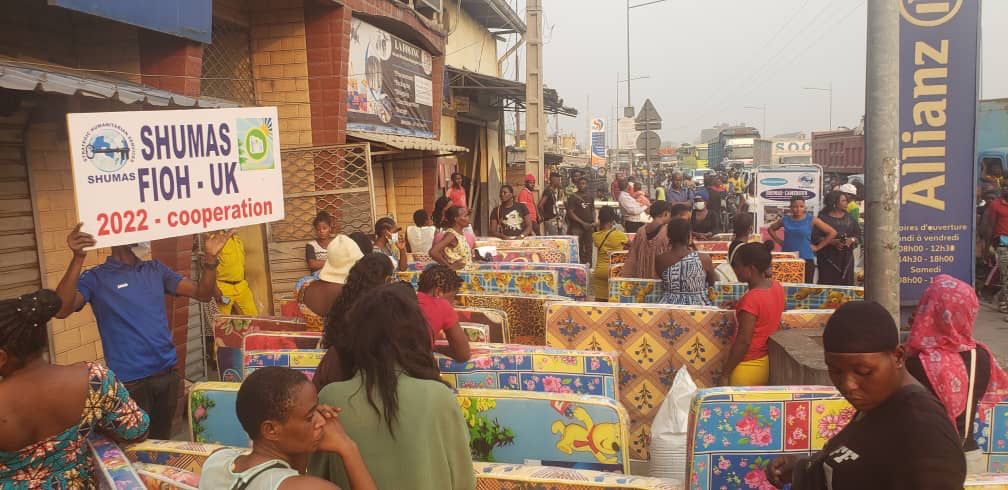Shumas victims made victors
The persistent socio-political crisis in the Northwest and Southwest Regions of Cameroon that started in 2016 has led to dreadful consequences. Most families (women and children) have displaced to cities like Bamenda, Douala, Yaoundé, and other cities in the country to enroll in schools and seek for a means of survival. This has resulted in many Internally Displaced Persons (IDPs) who are facing city realities of high living standards and unemployment, while most of them are living in extremely deplorable conditions such as the lack of shelter, no WASH facilities, no food, no source of income etc.
The situation has left these IDPs especially women and girls traumatized, and some are at the verge of committing suicide, as one of them cited during the baseline survey, “I wish the world ends today” These precarious situations have exposed girls and women to chronic adversities such as prostitution for survival, child labor, early marriages, and Gender Based Violence. SHUMAS came across several of such cases in Douala, during a multi-sectorial needs assessment conducted in October of 2021. In a project aimed at improve the living conditions of 50 vulnerable young girls/women 17-35 years exposed to prostitution and other adversities through psychosocial support, training and support on business management and provision of emergency relief items, SHUMAS intervened through preventive and curative measures for those already involved in GBV or traumatized due to the ongoing Anglophone crisis presently living in the city of Douala.
This was by offering psychosocial support (PSS), livelihood, WASH and shelter assistance to these vulnerable IDP GBV survivors. Out of the 50 vulnerable girls and women that benefited from the project, all 50 were provided group counseling, out of the 50, 13 were trained on business management and provided business startup materials. 37 of the 50 beneficiaries were provided WASH and shelter items. The project carried out in partnership with Future in Our Hands (FIOH-UK) was extended to the city of Bamenda where 5 vulnerable IDP women were also trained on business management and provided with business startup materials with 30 benefiting from WASH and shelter items.
Testimony: Peru’s Story (one of the beneficiaries – actual name concealed and pseudonyms used for protection purposes) Smart and intelligent yet played by life, Peru is a 22 year old grown raised by a single mother and her grandmother. Her mother died when she was just four, and she moved to live with her grandmother in Nkambe where she attended primary school under very difficult conditions always having to be sent out of school for nonpayment of fees. She managed to complete her primary education and could not continue with school due to lack of means not withstanding her brilliant performance. After great effort, her grandmother paid for her training in tailoring which lasted for just four months before the crisis in Anglophone Cameroon intensified.
She was sixteen then, and her grandmother sent her to work as a house maid for a family in Douala for a monthly pay of 15,000 FRS. After working for 6 months, she decided to learn décor but got reprimanded by her mistress who thought she was focusing on learning her craft and ignoring house chores. To keep her from learning the trade, the mistress sent Peru to Bafoussam to live with and care for her mother. In Bafoussam, she suffered emotional and psychological abuse and got convinced by her boyfriend to return to Douala, live with him and to continue learning her craft, an advise she heeded, but later got advised by her relative to keep away from cohabiting with a boy given that she was young. She agreed and fortunately for her, she got a new job as a housemaid. In her new home however, she later suffered sexual abuse from the father of that house at the age of 17.
The man abused her severally and continued to do so at every opportunity. Frustrated, she approached the mother of the house for solace but instead got physically assaulted and sent out of the house and fell in the hands of a bike rider with whom she lived as a girlfriend, having no one and nowhere else in Douala to run to. Eventually, she got pregnant but her boyfriend denied responsibility and continuously abused her throughout the pregnancy period. She lived miserably through the pregnancy period with no access to antenatal care and was later moved back to the village where she lived with the boyfriend’s sister until she put to birth.
During this time, she received no help from the boy and because she needed to take care of herself and her newborn baby, she moved back to Douala, where she started a sugarcane business which collapsed due to lack of capital, and desperate for survival, she engaged in prostitution. In one of our discussions with her, she said; “I do not have self-confidence and I have nothing. My boyfriend maltreats me because he knows I have no one to run to and he is not known by my family and therefore is not accountable to anyone.” Peru’s breakthrough came when she was selected to benefit SHUMAS’s psychosocial and livelihood assistance. After her rehabilitation sessions, she received a startup capital worth 50,000 FRS to operate a puff balls business. She started with the frying and selling of puff balls in the morning and evening hours and within two months of operation, she was able to add rice and stew, beans, pap and spaghetti to her menu. She currently makes more than 5000 FRS daily and has earned respect from the father of her child and the community.
She takes full care of her baby and herself and has employed another person to assist her in her business upon a salary of 15,000 FRS per month. She hopes to open a big restaurant with time, employ more workers to assist so that she can spare sometime for school.
